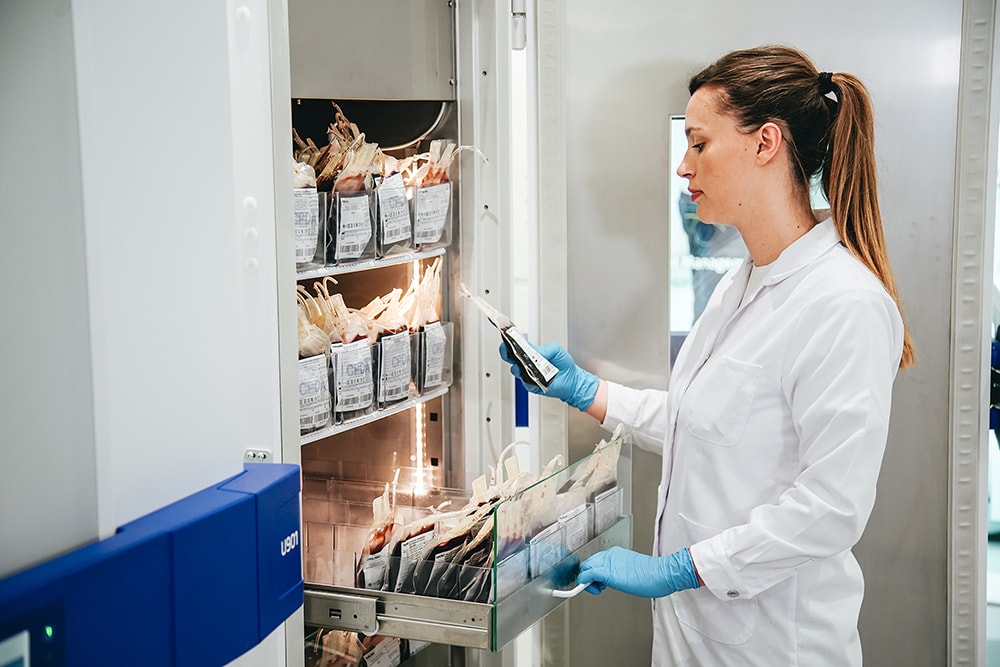Blog
The Medical Cold Chain and sustainable health systems
Sustainability is becoming more important for all industries, sectors, and organisations. Sustainable health systems are even more critical as they play a crucial role in achieving societal health and welfare. The World Health Organization (WHO) defines an environmentally sustainable health system as one that improves, maintains, or restores health while minimising the negative impact on the environment and leveraging opportunities to restore and improve it to the benefit of the health and well-being of current and future generations.
Even though there are several components to them, discussions related to sustainable health systems revolve a lot around emissions. One of the contributors to emissions in a health system is the medical cold chain. It is common knowledge that hospitals, laboratories, and other medical or research institutions use cold chains in their daily operations and that these products can sometimes be very energy-intensive, resulting in significant CO2 emissions.
Temperature sensitivity, the medical cold chain, and emissions
Temperature plays a crucial role in molecular dynamics as it can affect the stability of many compounds. The higher the temperature, the more the thermal energy can increase the chances of chemical compositions breaking and more stable ones forming. In the medical world, high temperatures can lead to irreversible changes within molecules found in various medications, thereby reducing their effectiveness.
The same can happen to many vaccines and samples such as blood, as they are biological products that are thermosensitive in nature. If they get exposed to inappropriate temperatures, important components they are made of can degrade, thus diminishing their potency. Once this happens, the clinical and research utility of these biologicals is lost. Therefore, it is critical to maintain vaccines, medicines, and biological samples protected from temperature variations and safely store and transport them across their supply chain networks.
The medical cold chain, the network of medical-grade refrigerators, freezers, and transport solutions designed to always keep biologicals at their intended temperature throughout their distribution process, is the natural solution to this problem. Even though these solutions play a crucial role in maintaining the intended temperature required by many biologicals, they are also some of the most energy-consuming devices in the healthcare industry. Furthermore, as several of these units use non-green refrigerants, they run the risk of resulting in harmful emissions affecting the environment.
Until a few decades ago, the use of chlorofluorocarbons (CFCs) and hydrochlorofluorocarbons (HCFCs) based refrigerants were common in refrigerating solutions across the world. These refrigerants, known now for their significant Ozone Depletion Potential (ODP) and Global Warming Potential (GWP), eventually came under scrutiny due to the severe damage they were causing to the ozone layer and their greenhouse effect. Because of this, in time, these products started to be phased out. During the same period, a new type of refrigerants emerged – the Hydrofluorocarbon (HFC) refrigerants. As these new gases had no measurable effect on the ozone layer, they quickly found widespread applications, but it rapidly became evident that these were powerful greenhouse gases with a global warming effect up to 23,000 times greater than carbon dioxide (CO2).
With HFCs becoming the fastest-growing source of greenhouse emissions worldwide, the international community triggered several regulations around HFCs and the use of refrigerants with high GWP, paving the way for the adoption of natural refrigerants. Of these regulations, the most prominent are the US SNAP program and the EU F-Gas regulations. Now, even though more manufacturers of these devices have started switching to green gas and natural refrigerant models, several cold chain products continue to harm the environment because their emissions still exist.
Hospitals, and the challenge of sustainability
Hospitals are at the centre of many clinical activities such as surgeries, blood transfusions, treatments, and more. They need to preserve many different types of biologicals such as medicines, vaccines, and various types of samples, which are often thermosensitive. To achieve this, they require an extensive cold chain able to meet the many different temperature requirements of all these thermosensitive specimens. Because of this, hospitals are at the centre of discussions regarding how high-quality care can be given in the most sustainable and climate-friendly manner. Moreover, today’s healthcare systems are under tremendous pressure from the pandemic as new requirements add to the existing demands for good healthcare services and the constraints of disproportionate funding. These factors are pushing hospitals to turn to sustainable solutions that can deliver the lowest cost of operations in the most reliable and environmentally friendly way possible. In short, it’s all about how hospitals can create a healthier future for the communities while addressing environmental concerns. Understanding the cold chain requirements of a healthcare system and ensuring that the solutions employed are energy-efficient, reliable, and use green refrigerants can bring more than one advantage to hospitals and other healthcare institutions.
One of the other aspects that need to be considered while designing sustainable infrastructure is the operational cost. Often, to reduce the upfront purchase costs, several procurement departments opt for cheaper products. However, these products might feature high energy consumption and higher costs associated with HVAC (Heating, Ventilation, and Air Conditioning), resulting in a significantly higher Total Cost of Ownership (TCO) during the lifespan of the product. Moreover, products of mediocre quality can result in frequent breakdowns/repairs that can further add to the cost of ownership, and in extreme cases, lead to the premature replacement of the cold chain device and the procurement of new ones.
B Medical Systems and its range of solutions for sustainable health systems
B Medical Systems has a long legacy of helping governments and organisations across the world tackle every challenge related to the cold chain, including those related to the creation of sustainable health systems. Over the last 40+ years, our company has enabled several millions of children globally to access vaccines at their fullest potency, irrespective of their location. Already known for bringing several innovative products to the market, our journey of manufacturing sustainable products dates to the year 2010, when we launched our first line of green products. This was followed by the launch of Solar Direct Drive (SDD) Refrigerators and Freezers that rely on solar power to ensure the stable and uniform intended temperature in the refrigerated space. Today, B Medical Systems is one of the few players offering a broad and complete portfolio of medical refrigeration devices that use green refrigerants, ideal for buildind sustainable health systems.
To bring more sustainable products to the market, we continued our efforts of increasing the energy efficiency of our devices and designed our portfolios of Medical Refrigeration and Blood Management Solutions to function with green gases. Specifically, we were able to significantly reduce harmful emissions by using green refrigerants like R600A, which has a zero Ozone Depletion Potential (ODP) and minimal Global Warming Potential (GWP). Additionally, structural features like insulated doors and sealed gaskets that minimise cold air loss and heat conduction make its refrigeration solutions more energy efficient. These devices comply with regulations such as the EU F-Gas and the US SNAP. Furthermore, we also possess several Energy Star certified models in our portfolios.
To help hospitals in their sustainability efforts, we offer medical-grade Laboratory Refrigerators, Pharmacy Refrigerators, Laboratory Freezers, Blood Bank Refrigerators, Plasma Storage Freezers, Ultra-Low Freezers, and Transport Boxes. These products are designed with a meticulous focus on quality and are EU MDR Class I/II(a) and US FDA Class I/II medical devices. Some of the major features of these devices (varying between each product) are:
- Uniform and stable temperature distribution.
- Superior holdover times and Door Opening Recovery (DOR).
- Energy efficiency.
- Ability to operate at high ambient temperatures like +43°C.
- 5-layer/4-layer PMMA organic glass provides superior insulation and visibility.
- Superior cabinet insulation.
- Audio-visual alarms including a rechargeable battery backup.
- 7” touchscreen for easy access control of the device.
- 24/7 Remote Monitoring.
- USB Data exports.
High energy efficiency is also related to lower HVAC costs which translate into lower operational costs. This, along with the reliability and durability of the products, ensures a lower Total Cost of Ownership for our products. We also offer 24/7 remote monitoring solutions, thereby ensuring one more layer of security for all temperature-sensitive specimens stored in our products.
Product focus: Ultra-Low Freezers
One of the most energy-intensive medical refrigeration products sustainable health systems may need is the Ultra-Low Freezer (ULT), which is typically employed for the long-term storage of samples with temperatures reaching as low as -86°C. Biologicals stored within these devices range from genetic materials such as DNA and RNA to cell and tissue samples. Moreover, new advances in vaccine research related to COVID-19 have expanded the use of these products to include the storage of thermosensitive mRNA vaccines as well, making them essential for immunisation campaigns around the world. This is the reason why hospitals worldwide have started deploying them in large quantities when only years before these devices would be used almost exclusively in a laboratory setting. Because of the extreme temperatures they need to reach, Ultra-Low Freezers can consume as much energy as an average family household and, because of this high energy consumption, the CO2 emission potential is high. In certain cases, an Ultra-Low Freezer and its related HVAC system can produce up to 100 tons of CO2 in its life span.
Our Ultra-Low Freezers are designed with several features which increase their energy efficiency: vacuum insulated panels along with polyurethane foam form a thick insulation layer minimising the heat conduction through the walls of the cabinet, and the gaskets made of silicon lips and foam provide strong sealing along with good thermal insulation in comparison with the traditional cavity-based gaskets while also reducing the frost build-up. Our Ultra-Low Freezers are designed with two inner aluminium doors that reduce cold air loss and heat conduction when the outer door is open. These doors also close sections of the freezer in a way that cold air cannot exit out of the entire ULT when only one shelf needs to be accessed, thereby minimising the need for the device to work overtime to recreate the cold air lost during the door opening. Moreover, the units use green refrigerants that further enhance their cooling efficiency. These refrigerants are also comparatively inexpensive to manufacture and are known for their long-term availability, driving up their cost-effectiveness.
Sustainable innovation is the key to the future
The modern world is changing rapidly, demanding continuous innovation to solve ever more challenging issues. However, this progress is not worth achieving if it means meeting our needs by compromising the ability of future generations of meeting theirs. Therefore, governments, companies, and individuals need to take action to curb their impact on the environment. In the medical cold chain field, manufacturers need to create sustainable refrigeration solutions that allow medical and research professionals to continue their efforts without increasing CO2 emissions. B Medical Systems, the world leader in the Vaccine Cold Chain and a leading player in the Medical Refrigeration and Blood Management Solutions fields, is up for the challenge and ready to provide hospitals, laboratories, vaccination centres and more, sustainable cold chain solutions which can reliably meet all their medical refrigeration needs. We believe in building a sustainable infrastructure for all medical and pharmaceutical institutions, and we will keep innovating to help create sustainable healthcare systems around the world.



